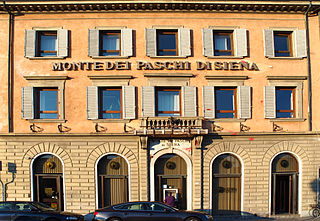
Banking in the United States began by the 1780s along with the country's founding and has developed into highly influential and complex system of banking and financial services. Anchored by New York City and Wall Street, it is centered on various financial services namely private banking, asset management, and deposit security.

Financial institutions, sometimes called banking institutions, are business entities that provide services as intermediaries for different types of financial monetary transactions. Broadly speaking, there are three major types of financial institutions:
- Depository institutions – deposit-taking institutions that accept and manage deposits and make loans, including banks, building societies, credit unions, trust companies, and mortgage loan companies;
- Contractual institutions – insurance companies and pension funds
- Investment institutions – investment banks, underwriters, and other different types of financial entities managing investments.
A financial system is a system that allows the exchange of funds between financial market participants such as lenders, investors, and borrowers. Financial systems operate at national and global levels. Financial institutions consist of complex, closely related services, markets, and institutions intended to provide an efficient and regular linkage between investors and depositors.
Bank of America Home Loans is the mortgage unit of Bank of America. In 2008, Bank of America purchased the failing Countrywide Financial for $4.1 billion. In 2006, Countrywide financed 20% of all mortgages in the United States, at a value of about 3.5% of United States GDP, a proportion greater than any other single mortgage lender.
A mortgage broker acts as an intermediary who brokers mortgage loans on behalf of individuals or businesses.

The Fair and Accurate Credit Transactions Act of 2003 is a United States federal law, passed by the United States Congress on November 22, 2003, and signed by President George W. Bush on December 4, 2003, as an amendment to the Fair Credit Reporting Act. The act allows consumers to request and obtain a free credit report once every 12 months from each of the three nationwide consumer credit reporting companies. In cooperation with the Federal Trade Commission, the three major credit reporting agencies set up the web site AnnualCreditReport.com to provide free access to annual credit reports.

The Office of Thrift Supervision (OTS) was a United States federal agency under the Department of the Treasury that chartered, supervised, and regulated all federally chartered and state-chartered savings banks and savings and loans associations. It was created in 1989 as a renamed version of the Federal Home Loan Bank Board, another federal agency. Like other U.S. federal bank regulators, it was paid by the banks it regulated. The OTS was initially seen as an aggressive regulator, but was later lax. Declining revenues and staff led the OTS to market itself to companies as a lax regulator in order to get revenue.
Mortgage bank is a bank that specializes in originating and/or servicing mortgage loans. In the United States, a mortgage bank is a state-licensed banking entity that makes mortgage loans directly to consumers. The difference between a mortgage banker and a mortgage broker is that the mortgage banker funds loans with its own capital.
A non-banking financial institution (NBFI) or non-bank financial company (NBFC) is a financial institution that does not have a full banking license or is not supervised by a national or international banking regulatory agency. NBFC facilitate bank-related financial services, such as investment, risk pooling, contractual savings, and market brokering. Examples of these include insurance firms, pawn shops, cashier's check issuers, check cashing locations, payday lending, currency exchanges, and microloan organizations. Alan Greenspan has identified the role of NBFIs in strengthening an economy, as they provide "multiple alternatives to transform an economy's savings into capital investment which act as backup facilities should the primary form of intermediation fail."
Bank regulation in the United States is highly fragmented compared with other G10 countries, where most countries have only one bank regulator. In the U.S., banking is regulated at both the federal and state level. Depending on the type of charter a banking organization has and on its organizational structure, it may be subject to numerous federal and state banking regulations. Apart from the bank regulatory agencies the U.S. maintains separate securities, commodities, and insurance regulatory agencies at the federal and state level, unlike Japan and the United Kingdom. Bank examiners are generally employed to supervise banks and to ensure compliance with regulations.

A bank is a financial institution that accepts deposits from the public and creates a demand deposit while simultaneously making loans. Lending activities can be directly performed by the bank or indirectly through capital markets.
The New York State Banking Department was created by the New York Legislature on April 15, 1851, with a chief officer to be known as the Superintendent. The New York State Banking Department was the oldest bank regulatory agency in the United States.

The Oklahoma State Banking Department (OSBD) is an agency of the state of Oklahoma. The Banking Department is responsible for regulating Oklahoma's banking system, including state-chartered banks, credit unions, savings and loan associations, and trust companies, as well as [(money transmitters)] and money order companies. The department also handles consumer complaints involving state-regulated financial institutions.
The Pennsylvania Department of Banking and Securities is a cabinet-level agency in Pennsylvania.
The New Jersey Department of Banking and Insurance (DOBI) is one of 15 principal departments in New Jersey government. The department's mission is to regulate the banking, insurance and real estate industries in a professional and timely manner that protects and educates consumers and promotes the growth, financial stability and efficiency of these industries. The Commissioner of DOBI is Marlene Caride.

The New York State Department of Financial Services is the department of the New York state government responsible for regulating financial services and products, including those subject to the New York insurance, banking and financial services laws.

The California Department of Financial Protection and Innovation (DFPI), formerly the Department of Business Oversight (DBO), regulates a variety of financial services, businesses, products, and professionals. The department operates under the California Business, Consumer Services and Housing Agency.

The Colorado Department of Regulatory Agencies (DORA) is the principal department of the Colorado state government responsible for professional licensing and consumer protection.

The Wisconsin Department of Financial Institutions (DFI) is an agency of the Wisconsin state government responsible for state regulation of financial institutions and educating the public about financial issues.
The Dodd–Frank Wall Street Reform and Consumer Protection Act was created as a response to the financial crisis in 2007. Passed in 2010, the act contains a great number of provisions, taking over 848 pages. It targets the sectors of the financial system that were believed to be responsible for the financial crisis, including banks, mortgage lenders, and credit rating agencies. Ostensibly aimed at reducing the instability that led to the crash, the act has the power to force these institutions to reduce their risk and increase their reserve capital.











